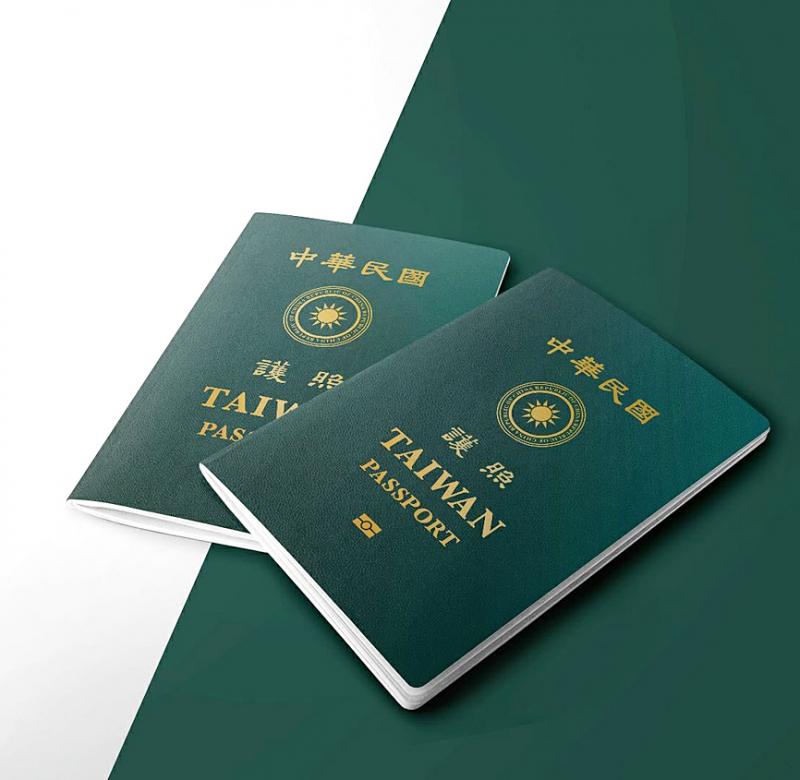Passports with a redesigned cover highlighting Taiwan would be issued starting on Jan. 11, the Ministry of Foreign Affairs said yesterday.
The new cover design, which was announced on Sept. 2, highlights Taiwan by printing the word in a larger font.
While the new passport cover retains “the Republic of China” in Chinese, the English name is printed along the outer circle of the national emblem, which would enable other nations to clearly identify that it is a Taiwanese passport, not a Chinese passport, the ministry said.

Photo: Su Chin-fong, Taipei Times
The costs and application procedures for the new version are the same as previous editions — NT$1,300 for citizens aged 14 and older and NT$900 for children under 14 — and applications can be made domestically or overseas, the ministry said.
Taiwanese can continue using their current passports until they expire, but they can also apply for a new passport if they wish, it added.
People submitting applications on Jan. 11 at the Bureau of Consular Affairs in Taipei or the ministry’s offices in central, southern, eastern and southwestern Taiwan would receive a small gift, the ministry said.
The first 100 people to file applications before noon on Jan. 11 would also qualify for a prize draw, with the winners to be chosen through a computer algorithm and announced that same day, the ministry said.
The nation’s embassies and representative offices around the world would inform the International Air Transport Association, as well as airlines, airports, and customs and immigration authorities in the countries where they are located to grant access to holders of new passports, it added.

GLOBAL ISSUE: If China annexes Taiwan, ‘it will not stop its expansion there, as it only becomes stronger and has more force to expand further,’ the president said China’s military and diplomatic expansion is not a sole issue for Taiwan, but one that risks world peace, President William Lai (賴清德) said yesterday, adding that Taiwan would stand with the alliance of democratic countries to preserve peace through deterrence. Lai made the remark in an exclusive interview with the Chinese-language Liberty Times (sister paper of the Taipei Times). “China is strategically pushing forward to change the international order,” Lai said, adding that China established the Asia Infrastructure Investment Bank, launched the Belt and Road Initiative, and pushed for yuan internationalization, because it wants to replace the democratic rules-based international

ECONOMIC BOOST: Should the more than 23 million people eligible for the NT$10,000 handouts spend them the same way as in 2023, GDP could rise 0.5 percent, an official said Universal cash handouts of NT$10,000 (US$330) are to be disbursed late next month at the earliest — including to permanent residents and foreign residents married to Taiwanese — pending legislative approval, the Ministry of Finance said yesterday. The Executive Yuan yesterday approved the Special Act for Strengthening Economic, Social and National Security Resilience in Response to International Circumstances (因應國際情勢強化經濟社會及民生國安韌性特別條例). The NT$550 billion special budget includes NT$236 billion for the cash handouts, plus an additional NT$20 billion set aside as reserve funds, expected to be used to support industries. Handouts might begin one month after the bill is promulgated and would be completed within

Taiwan is projected to lose a working-age population of about 6.67 million people in two waves of retirement in the coming years, as the nation confronts accelerating demographic decline and a shortage of younger workers to take their place, the Ministry of the Interior said. Taiwan experienced its largest baby boom between 1958 and 1966, when the population grew by 3.78 million, followed by a second surge of 2.89 million between 1976 and 1982, ministry data showed. In 2023, the first of those baby boom generations — those born in the late 1950s and early 1960s — began to enter retirement, triggering

The National Development Council (NDC) yesterday unveiled details of new regulations that ease restrictions on foreigners working or living in Taiwan, as part of a bid to attract skilled workers from abroad. The regulations, which could go into effect in the first quarter of next year, stem from amendments to the Act for the Recruitment and Employment of Foreign Professionals (外國專業人才延攬及僱用法) passed by lawmakers on Aug. 29. Students categorized as “overseas compatriots” would be allowed to stay and work in Taiwan in the two years after their graduation without obtaining additional permits, doing away with the evaluation process that is currently required,